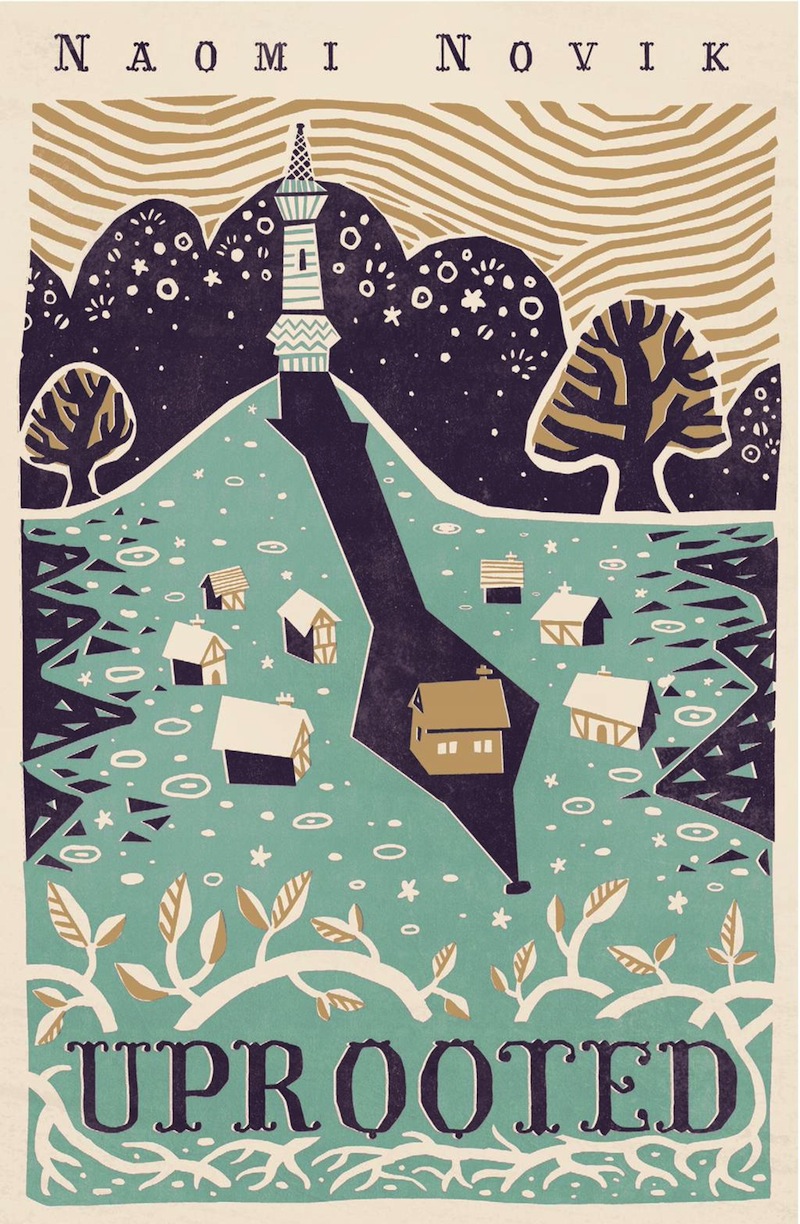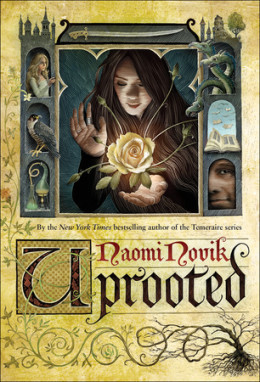This review of Naomi Novik’s much-discussed new fantasy novel, Uprooted, is for people like me who read the first three chapters online, or perhaps got only that far in the book proper, and came away with rather the wrong impression.
Uprooted is not, as I thought it might be after those first three chapters, any of the following: a Beauty and the Beast story; a somewhat quiet tale about learning one’s magical abilities and negotiating a relationship with one’s teacher; or a story that includes intrinsically-gendered magic. What it is, is a kingdom-level fantasy with great magic and an engaging narrator—which packs a surprising amount of plot into its single volume. I recommend it highly.
I think I must’ve gotten the impression that this would be a somewhat slow, meditative, craft-focused book from a couple different places. Most significantly, the first three chapters’ general scene-setting reminded me of another single-volume kingdom-level fantasy I’d just finished, Katherine Addison’s excellent The Goblin Emperor, which is not exactly briskly-paced. In addition, I think I subconsciously noticed two possible homages to Robin McKinley: the full title of a significant spell is Luthe’s Summoning, which seems likely to be a reference to one of the characters in The Hero and the Crown; and the local river is named the Spindle, which may or may not have been meant to evoke the novel Spindle’s End. I don’t remember the pacing of The Hero and the Crown very well, but Spindle’s End (which I love immensely) is certainly not wall-to-wall action.
The first three chapters do establish the first-person narrator, Agnieszka (“ag-NYESH-kah,” per the author in the Acknowledgments), who I like very much and who is the most significant character in the book. (Narrators, even first-person ones, aren’t always.) She lives in a village near the Wood, and once every ten years the Dragon, a human wizard, takes a seventeen-year-old girl from the area to live in his tower. For years, people have expected Kasia, Agnieszka’s best friend, to be taken; but instead the Dragon takes Agnieszka, because he recognizes that she can do magic.
 As I said in the introduction, this does not turn out to be a Beauty and the Beast story in any significant way, which is good because I loathe Beauty and the Beast stories. (Their message is, “If only you love me enough, I’ll stop abusing you.”) There is a romance, which I did not find particularly compelling (possibly because it’s not the one I was hoping to see), but it’s a small enough element that I can let it pass. Rather, the bulk of the book is about Agnieszka as she learns, grows, and faces the insidious, corrupting, inexorable threat of the Wood.
As I said in the introduction, this does not turn out to be a Beauty and the Beast story in any significant way, which is good because I loathe Beauty and the Beast stories. (Their message is, “If only you love me enough, I’ll stop abusing you.”) There is a romance, which I did not find particularly compelling (possibly because it’s not the one I was hoping to see), but it’s a small enough element that I can let it pass. Rather, the bulk of the book is about Agnieszka as she learns, grows, and faces the insidious, corrupting, inexorable threat of the Wood.
The Wood is a wonderful antagonist. I’ve been extremely engaged by the action scenes in Novik’s previous books, and after the first chapters, Uprooted essentially turns into a series of increasingly-intense magical struggles as the Wood’s corrupting influence escalates and diversifies. I could barely tear myself away from the book, the first time through; even the relative downtimes are full of tension and dread over what the Wood might do next.
The magical struggles are not only exciting, but they showcase Novik’s ability to write magic that is emotionally evocative and pleasingly non-mechanical—something the Temeraire books haven’t provided the opportunity for. And, though this isn’t immediately apparent, Agnieszka’s different experience of, and approach toward, magic is a matter of her personality and background, not gender, as I’d also feared based on the opening.
My fairytale and folklore background is patchy enough that I can’t speak to how Novik uses elements of Eastern European tales; the novel must stand alone to me, and it does that very well. Of course it uses the surface elements of fairy tales (woods, wolves, villages, wizards in towers, princes, lost queens, magical swords, etc. etc.), and in a way that feels cohesive. But Uprooted is also part of the modern fairy-tale retelling tradition, because it is very much concerned with which stories get told, why and how they are told, and what truths might underlie them. That focus makes the novel not just exciting, but emotionally satisfying, and very much worthy of reading.
Uprooted is available now in the US from Del Rey and in the UK from Tor Books UK.
Kate Nepveu was born in South Korea and grew up in New England. She now lives in upstate New York where she is practicing law, raising a family, and (in her copious free time) writing at Dreamwidth and her booklog. She is eagerly anticipating the last Temeraire novel.










